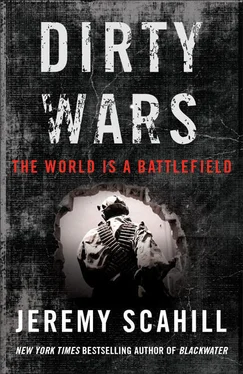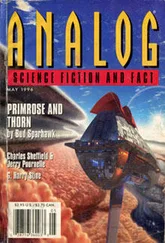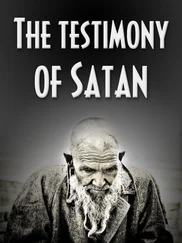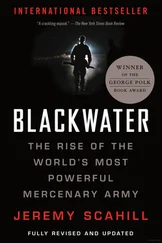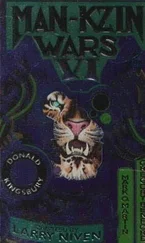Dealing with the Iraq insurgency would become an almost totally consuming task for the bulk of America’s most elite forces, though Rumsfeld and Cheney had global aspirations for JSOC’s expanded use. Rumsfeld signed an executive order on September 16, 2003—the same month that Holland retired as SOCOM commander, and General Bryan “Doug” Brown took over—establishing JSOC as the principal counterterrorism (CT) force of the United States. It contained preauthorized lists of fifteen countries where CT action might be taken and specified which actions could be carried out. Brown, a SOF vet and founding member of the 160th Special Operations Aviation Regiment, told the Senate that “the nexus of the Department of Defense’s global war on terrorism is at USSOCOM.” SOCOM, a newly established, free-standing command, would be “the lead combatant commander for planning, synchronizing, and as directed, executing global operations against terrorist networks in coordination with other combatant commanders.” A month later, Rumsfeld was demanding answers from his senior advisers. “Are we capturing, killing, or deterring and dissuading more terrorists every day than the madrassas and the radical clerics are recruiting, training, and deploying against them?” Rumsfeld wrote in a memo to Wolfowitz, Feith and Myers.
It was an interesting question and one many were debating in the counterterrorism community. But, as al Qaeda’s leadership fled to countries throughout the Horn of Africa and Arabian Peninsula and into Pakistan, the premier US counterterrorism force would be given orders to focus entirely on a nation that had no al Qaeda presence before the US tanks rolled in a year earlier. The Pentagon had distributed decks of playing cards to troops in Iraq, assessing a value to various leaders of the former Baath regime. Saddam was the ace of spades. The tradition dated back to the US Civil War. But this time around, the cards were produced not just for the military but as a consumer product sold to the public. The Bush administration seemed to believe its own propaganda about how easy victory would be in Iraq, reasoning that by destroying the Baath Party and killing or capturing its leaders, the war could be won swiftly.
When McChrystal hit the ground in Iraq in October 2003, his Task Force 20, renamed Task Force 121, would lead the hunt. Its members included JSOC forces, British SAS commandos and some local Iraqi teams. Their job was to plow through the deck of cards. “The mission of the direct action, special operations task force was really to focus on the old regime leadership,” recalled Andrew Exum, who led a platoon of Rangers in Iraq as part of McChrystal’s task force. “The deck of cards—you know, the most wanted folks. I think that was based largely on the idea that the insurgency in Iraq, the fighting, kind of goes away if a lot of these guys go away.” That theory would prove to be fatally flawed.
Whatever the strategic value of the effort, however, it had some success in its immediate goals—taking out selected individual targets. At McChrystal’s right hand as the forward commander of JSOC’s High Value Targeting task force was William McRaven, a Navy SEAL renowned for his scholarly ambition. Although McChrystal would receive much of the credit for building up JSOC’s capabilities and overseeing its greatest hits, people in the Special Ops community knew that many of the key achievements of the HVT Task Force were largely McRaven’s doing.
Raised in San Antonio, Texas, McRaven grew up with an appreciation for the military—his father flew Spitfire fighter planes in World War II. The young Bill McRaven was a big fan of James Bond films—he was particularly enthralled by Sean Connery’s underwater exploits in Thunderball, according to his sister. “That was his favorite!” Nan McRaven told Time magazine. “I said to him, ‘You can grow up to be 007.’ I guess he did.”
McRaven graduated from the University of Texas in 1977 with a degree in journalism. He enrolled in Navy ROTC on campus, and right after graduating with an ensign’s commission, he entered SEAL training. After finishing his training he was deployed to the Philippines. When Richard Marcinko created the Naval Special Warfare Development Group, SEAL Team 6, in 1982, he asked McRaven to lead one of the constituent SEAL teams. Marcinko’s freewheeling leadership soon put him at loggerheads with his young lieutenant. Marcinko bought his SEALS expensive cars and financed debauched parties on navy property that included prostitutes. “The SEALS were happy, I was happy, and nobody was getting in trouble except Bill McRaven,” Marcinko told Time magazine, remembering McRaven as a killjoy. “He was a bright guy, but he didn’t like my rude and crude way. If I was a loose cannon, he was too rigid. He took the special out of special warfare.” McRaven saw it differently. “I was not some white knight on a horse going with my lance against the windmill,” McRaven countered. Marcinko “was the boss, I was a very young lieutenant. There were some things I didn’t think were exactly right…and he relieved me” of duty. According to a former Special Forces commander, Marcinko asked McRaven to carry out “some questionable activities,” adding that McRaven refused and “would not back down.” Other officers in SEAL Team 6 reportedly found McRaven’s integrity heroic, but after his run-in with Marcinko, “thought it was the end of his career.”
Actually, it was Marcinko whose career in black ops was coming to an abrupt end—while McRaven’s was just getting started. In March 1990, Marcinko was sentenced to twenty-one months in prison on charges he defrauded the US government in a weapons sale. McRaven was soon given command of a platoon in SEAL Team 4, focusing on South and Central America. Very few details are publicly available about McRaven’s combat history, though he was a “task unit” leader in the Persian Gulf War, according to his official biography. In 1991, he headed to the Naval Postgraduate School, and graduated in 1993. He helped to establish the Special Operations/Low Intensity Conflict program and was its first graduate. He received a dual degree, in SO/LIC and national security affairs. His graduate thesis, “The Theory of Special Operations,” was published in book form and would become widely read and taught. The book analyzed several key Special Ops battles from World War II to Vietnam, presenting lessons that could be learned for future conflicts and wars. It is considered a seminal text in the study of Special Operations warfare. “Bill is reputed to be the smartest SEAL that ever lived,” a former commander said in 2004. McRaven went on to serve as a “task group commander” in the Middle East, and he also commanded SEAL Team 3, which operates in Southwest Asia. By 2001, he was a naval captain, commodore of the SEALS Special Naval Warfare Group 1.
Shortly after 9/11, McRaven’s SEAL team deployed to Afghanistan, but its commander could not join them. Two months before 9/11, McRaven had fractured his pelvis and part of his back during a parachute jump near his base in Coronado, California. Some predicted he might never fight again, let alone walk normally. McRaven resigned his command, but his career was not over. If anything, the parachute accident was fortuitous. Although McRaven was not on the battlefield initially, he would become a major player in the strategy that was to shape US counterterrorism operations for many years to come. Wayne Downing, newly appointed the deputy national security adviser for combating terrorism, asked McRaven to join his staff at the White House. McRaven ended up working for Downing for two years while he recovered from his injuries and is credited with having been the principal author of Bush’s “National Strategy for Combating Terrorism.” It was not a cushy job for a sidelined warrior. Captain McRaven would become the primary JSOC figure inside the National Security Council and coordinated the Office of Combating Terrorism. Among his jobs would be vetting and assembling lists of High Value Targets for JSOC to hunt down. He was one of the key players in militarizing US counterterror policy and building up the infrastructure for the creation of kill lists. McRaven’s time at the NSC would put him on a path to becoming one of the most powerful figures in US military history and a transformative figure in the institutionalization of assassination as a central component of US national security policy.
Читать дальше
